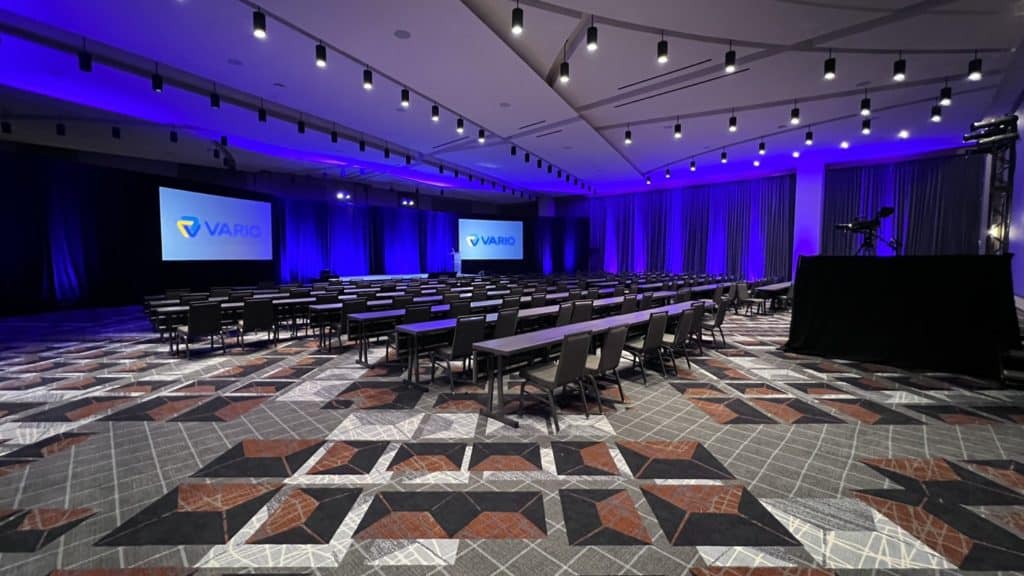Planning an event on your own can be complicated because so many vendors and stakeholders are involved. One of your best options is to use event management professionals who can take over the planning and organizing, reducing or eliminating your burden. How exactly do they do this, and how does event management work?
How Does Event Management Work?
Event management works by planning, organizing, coordinating, and managing various events, whether formal (business, promotional, award shows, trade shows, conferences, or conventions) or informal events (ceremonies, festivals, parties, or concerts). These components of event management are usually handled by professionals known as event managers.
Event manager oversee and manage the various elements and teams that make any event a success, including catering, music, decorations, and venue selection. You can also choose to handle a specific aspect on your own while working in collaboration with the hired event management professionals.
What Does Managing an Event Entail?
Generally, managing an event involves planning and organizing events. However, a good deal of other tasks goes into this process. For instance, event professionals take the client’s desires and brainstorm creative ideas to implement and bring them to life. They also can tackle various other aspects, such as:
- Budgeting and Finance (managing the client’s budget to achieve desired results)
- Logistics
- Hiring and managing service providers
- Managing guest invitations and accommodation (if required)
- Event design or decorations
- Security and Emergency Response preparedness
- Parking arrangements
Event management companies are typically used for large-scale events involving more technicality and formality, and take more time to plan. Two main categories of events that professional management works great for include Corporate events and Festive events.
Corporate Events
These are large-scale events held to foster business relationships or disseminate impactful information, and they include conferences, trade shows, summits, seminars, galas, company parties, award ceremonies, and product launches, among others. They are usually educational, informative, or networking oriented, but often combine all three. Popular event goals include fostering internal company culture, promoting products/services, or bringing together industry professionals to form strategic relationships.
Festive Events
These are informal events and are less strict than corporate events. They comprise plenty of social interactions and are highly flexible. They are usually held by individuals and organizations for various reasons. However, they generally have a celebratory theme. They include events such as festivals, weddings, sports competitions, music or fashion shows, and exhibitions.
What Are the Qualities of a Good Event Management Company?
Since the choice of an event management company or professional could make or break the entire event, the selection process is critical. To help your decision along, here are certain qualities that you should look for:
Expertise
You want reliable professionals with extensive experience, preferably in your industry or event type. Therefore, review their portfolio and the types of events they have organized in the past and, if possible, reach out to others who have worked with them. Reviews also provide good information about their expertise and experience.
Attention to Detail
A good management company pays very close attention to detail. Given that they would have to bring various concepts to life, this attribute is necessary to accomplish your goals. They should bring your vision to life by expertly designing and building appropriate themes.
Great Contacts
Usually, management companies have to work with various teams and other service providers to make the event a success. A good event management company collaborates with only the best in terms of the caterer, audio-visual, entertainment, security, decorators, and others.
Customer Satisfaction
Any good events management company is highly customer-centric, paying close attention to customer satisfaction and ensuring that clients are satisfied. They work with your preferences and schedule to meet your goals.
Good Management Skills
They have to be effective in budget and time management. Once the budget is discussed and agreed upon, they would have to work with the agreed-upon figure and efficiently meet your timeline. A good event management company must be highly flexible and great at improvising.
What Roles Do These Professionals Play?
- They do an excellent job of maintaining decorum at events. They coordinate security teams to control traffic and ensure risk control as well. They also manage the rest of the staff and ensure workflows are operating efficiently.
- These professionals help ensure proper teamwork through the coordination of skilled service providers like caterers, artists, security teams, and servers.
- These professionals may help handle publicity and advertisement through journalists, influencers, and other media.
- They may also help handle licenses and permits.
- These management professionals also deal with party clean-ups, termination of contracts with service providers, payments, and feedback.
Related Questions
What is the Most Important Aspect of Managing an Event?
Event planning is the most important aspect of managing an event. Inadequate preparation can cause the entire event to be a failure, so, the preparation stage is paramount next to the live event itself.
What is the Most Challenging Aspect of Managing an Event?
The most challenging aspect of managing an event is often the financials, such as working with a tight budget. Other challenging areas include dealing with unpredictable weather, understaffing, and having more (or less) than the expected number of guests.
Conclusion
With everything from planning and organizing to executing the event, it takes work. Several individuals with varying skills play essential roles in executing a perfect event. This is precisely why working with an event management company may be right for you.
Having planned thousands of events, Vario is excited to help you achieve your next goal. Our event production management team will handle all the details and find the right event planners/vendors for your event so that it is a complete success.







